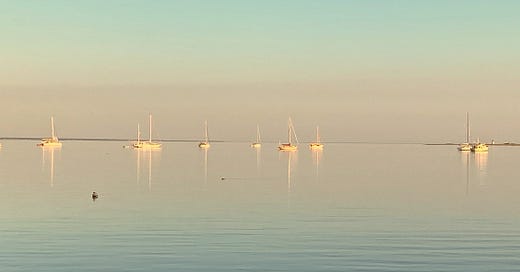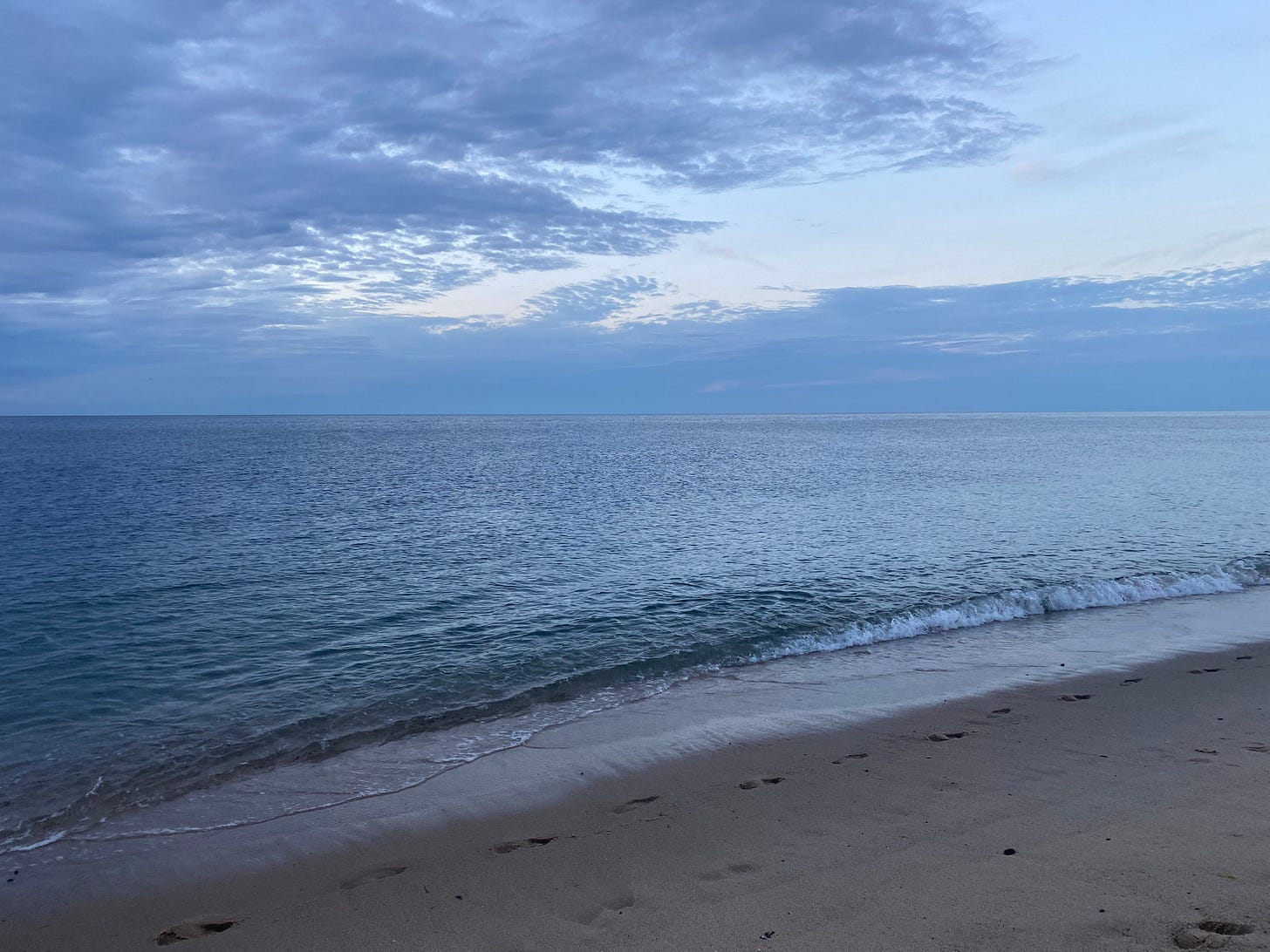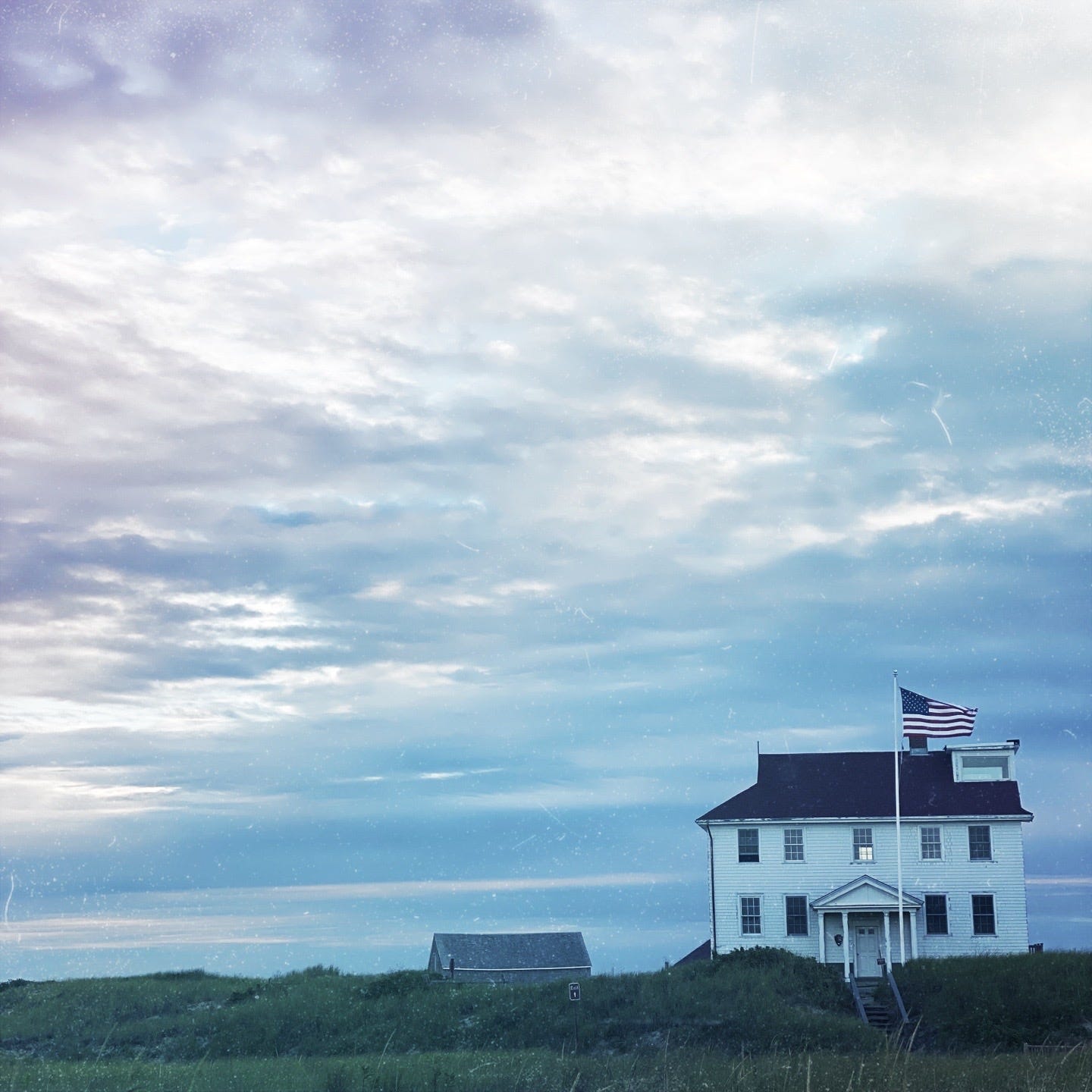I came to Provincetown for the first time in the summer of 1988, during a tectonic shift.
I had left someone I secretly loved at home in Manhattan and joined my father, step-mother, and her adult children for a week in Orleans, at the crook of the elbow that is Cape Cod. Skaket Beach was a few minutes from the house that Shirley and my father had rented, and Nauset, a short distance further. Nineteen eighty-eight was the year of syringes washing up on shore, and the safety of the water, questionable. So we did other things: my father and Shirley, in what is now known in my family as The Ambush, famously kidnapped me and Shirley’s daughter-in-law’s little sister Jean Marie and took us on a four-hour sunset whale watch when JM had other important obligations. The whale watch went over well, though, and when a humpback rolled over onto its side a few inches from the boat and its great round eye the size of a dinner plate focused directly on me, and then the people next to me, and then the baby being held by its young father a few feet from me, the space between us closed: the whale looked at me and I looked at her, and I whispered I am so sorry, and I believe she understood.
I returned alone to Provincetown later that week in 1988, intending to walk up and down Commercial Street carrying the weight of my own secrets, and to visit Fine Arts Work Center, a block past Bradford, on Pearl Street. My father was concerned: Don’t sit down on any toilet, he said. Don’t kiss anyone. Don’t share a glass. Don’t eat off the same fork. Don’t fool around with anyone. My father and I had a relationship that many saw as questionable in its propriety — we talked about everything, openly — and he was a deeply kind man, but, like many people in 1988, was fiercely, wildly afraid, and this sometimes tested his humanity, as fear often does. He didn’t know any better; I cut him that slack.
I walked up and down Commercial Street that day, past WomenCrafts at the corner of Pearl, past the bookstores and the tee-shirt shops, the stores selling cheap jewelry, the bars and the cabarets. Drag queens strolled down the center of the street, smoking cigarettes, marching along in four inch platform sandals. Skeletal men pushed other skeletal men in wheelchairs; a sandy-haired man with a perfect mustache, a Yorkie on his lap and a blanket around his shoulders sat in front of the library and faced the sun, his eyes closed. From one end of Commercial Street to the other — the East End with its galleries and restaurants to the West, past the wharf and The Lobster Pot and more tee shirt shops — were these men, sometimes pushed by other men, sometimes pushed by lesbians. Don’t fucking stare, I heard one of the women say to a tourist eating an ice cream cone, and walking ahead of me. They’re not on fucking display.
In 1988, I was heavily embedded in New York’s food and modern dance communities; the person with whom I was living was a well-known dancer with a small company, and three out of seven nights a week found us at City Center or DTW or The Joyce or BAM, watching Pina Bausch or Karole Armitage or Trisha Brown or Bill T. Jones & Arnie Zane. In March, Zane died; one by one, every company was pillaged. A hellscape of sorrow. During the day, I worked at the tiny Dean & Deluca on Prince Street; every department shrank and just two years later, thirty of the men I had worked with, all under the age of thirty-five, were gone.
On the late afternoon in the summer of 1988 when I walked alone down Commercial Street, I was struck by the sheer magnitude of the absurdity: tourists in lobster claw hats, kids eating fudge and taffy, dykes walking with ancient young men and their dogs, Gloria Gaynor’s I Will Survive
We’re moving to Provincetown We’re heading to Provincetown We’re going to Ptown We’re leaving for Provincetown was said by my few surviving friends, over and over. The spit of land, Mary Oliver’s blue comma on the map of the world hung like a hook into the ocean; the last stop for so many who were sick, who were treated like beasts by the medical establishment, who had been shunned by their families, abandoned in the name of religion, left to die: they came here. Most perished; a few survived. Art and music and poetry lived. The town nurse, Alice Foley, co-founded and was the first executive director of the Provincetown AIDS Support Group, now the AIDS Support Group of Cape Cod. On the late afternoon in the summer of 1988 when I walked alone down Commercial Street, I was struck by the sheer magnitude of the absurdity: tourists in lobster claw hats, kids eating fudge and taffy, dykes walking with ancient young men and their dogs, Gloria Gaynor’s I Will Survive — at first I was afraid I was petrified — blasting out of a cabaret, beauty and death and beauty and love and rage everywhere, everywhere, and if you got to Race Point even on a cloudy day you would stay for the sunset, and want to stay forever.
Into the early nineties, I began to read Provincetown: Mark Doty was published by the company I was then working for, and for whom I would go on to eventually be an executive editor. I had read his poetry for years, and then turned to Heaven’s Coast, and then, in 2008, to Dog Years, much of which takes place at 19 Pearl Street, half a block or so from Fine Arts Work Center, where I was in residency last week. Before I was at Harper, I was at Little, Brown, and found a pile of dinged books to be donated; on top was a hardcover copy of Mary Oliver’s 1983 American Primitive, its spine cracked and opened to In Blackwater Woods,
To live in this world you must be able to do three things: to love what is mortal; to hold it against your bones knowing your own life depends on it; and, when the time comes to let it go, to let it go.
Like so many people who come to the tip of Cape Cod for safety, for community, for the light, I have had very long bouts of staying away because every visit is densely saturated with memory and grief and beauty so breathtaking that it feels otherworldly. The Provincetown of 2023 is nothing at all like the Provincetown of 1988. There are a few people — all of us now in our fifties, sixties, and seventies — who were there, who remember what happened, what it was like, this blue comma on the map of the world. Adam Singer, owner of Adam’s Nest, on Commercial Street, told me last week that when he first opened in 2016, the town’s carnival theme was Back to the Eighties. Dear God, he said, never. Never again.
Now when I return to Provincetown, a queer writer who has just hit sixty, I do so because of words and work, which made it all the more impossible that, after so much time, I finally saw through the grief and the ghosts to the physical beauty of the place itself, to the light. I was there to finish my next book; I wrote for eight hours a day without looking up, moving from desk to bed to couch to teapot to desk, and what came to me was the withering realization that I had gotten the voice all wrong, and that it — even its little craft-book self — needed itself to be comprised of stories coiled around a core of permission to create, to love, to breathe. The Provincetown air and light suffuse the very idea of permission itself, which is why it has drawn so many who sought acceptance to make their art in whatever form it comes, to live their lives with authenticity and pride, to die under its massive sky when the tectonic plates shifted.
Provincetown is ethereal; it is hard to hold it, and I forever am getting turned around when I’m there. Possessed of my navigator father’s sense of direction (my wife would argue this point) I never know what’s north or south, east or west. Eileen Myles said it best, writing in Agni about flying in to Provincetown: From the bowl of the sky I can never bother to try and understand land. For me it puts way too much burden on the experience to start building a map.
Provincetown cannot be mapped; the sands are always moving and shifting, the light always changing.








Thank you for this. The 80’s are still reverberating for all who lived through them. Who were witnesses in large or small ways. Who carry the memories of countless friends lost. The witnessing of both cruelty and incredible compassion side by side.
My brother met his partner at the beginning of that decade. They built a business and a life together. Moving a few times and establishing a business each time. By the end of the decade he was HIV positive, his partner was not. He was told he had six months to live at best. That was the thinking. The experience. They moved back to California to be closer to family and friends on the west coast. Their relationship changed but continued - they looked out for one another always.
I too was wrestling with my secret. The younger brother of whom much was expected and assumed. The 80’s became for me a time of hiding. I mourned the loss of my brother in advance, trying to be prepared, to accept. For the first time I sought help with my secret. In my case a therapist. In time I came out in the 90’s.
My brother lived on. Several close calls, but he was one of the lucky ones. Game changing therapies were arriving. Over the years he stared down so many health threats. When prostate cancer knocked on his door on 2019, we figured it too would be defeated. We talked many nights on the phone. By then I was long since “out”, and our friendship as brothers stronger than ever. He beat that cancer. But another one was stealthier. Malignant melanoma. When he turned sixty he said he was amazed he had made it this far and set his sights on seventy. But this horrid cancer had other plans. It moved relentlessly into bones, organs, brain.
I was with him in his last days, a year ago in August, less than 6 weeks after my wedding and his 61st birthday. We had late night talks in the hospital, floating over the city of Seattle in the 10th floor cancer ward in a surreal bubble of our own. He talked about those lost friends in those years. And when his brain worked, faces and names and stories connected. At other times just the stories. Names lost in a drawer full of words not connected in his mind.
His partner had died a few years earlier. They loved Key West. They took my Mom there once. My husband and I went there on our honeymoon. Sending him photos of familiar places they knew.
I’ve been to Provincetown, in 2001. It’s hard to picture the devastation playing out in so many cities in the 80’s. Yet we know it did. Your account does that well. A vast swath of unfathomable death.
The most beautiful thing I’ve read lately. Thank you for this devastating and beautiful work. ♥️